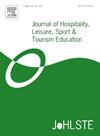Developing career intention of Gen Z hospitality students: The roles and matters of experiential learning, problem-solving skills, positive thinking skills and adaptability skills
IF 4.1
2区 教育学
Q1 EDUCATION & EDUCATIONAL RESEARCH
Journal of Hospitality Leisure Sport & Tourism Education
Pub Date : 2025-06-02
DOI:10.1016/j.jhlste.2025.100560
引用次数: 0
Abstract
This study aims to investigate the factors influencing career intentions among Gen Z students in the hospitality industry, focusing on the roles of Experiential Learning, Problem-Solving Skills, Positive Thinking Skills, and Adaptability Skills. The target population consists of 409 Thai hospitality students who have undergone internship experiences and belong to the Gen Z cohort. A convenience sampling method was employed to collect data using a structured questionnaire that was validated for content validity and reliability. Data analysis was conducted using Partial Least Squares Structural Equation Modeling (PLS-SEM). The findings revealed that experiential learning had a direct positive effect on problem-solving skills, positive thinking skills, and adaptability skills. Furthermore, these three skills significantly influenced career intentions, with positive thinking skills and adaptability skills serving as key mediating variables in the relationship between experiential learning and career intentions. These insights offer valuable implications for curriculum development and the design of learning activities that enhance integrated competencies among hospitality students, as well as for formulating strategies to develop future-ready human capital aligned with the dynamic and complex nature of the hospitality industry.
培养Z世代酒店学生的职业意向:体验式学习、解决问题能力、积极思考能力和适应能力的作用和重要性
本研究旨在探讨影响酒店行业Z世代学生职业意向的因素,重点关注体验学习、问题解决能力、积极思考能力和适应能力的作用。目标人群包括409名泰国酒店管理专业的学生,他们都有实习经历,属于Z世代。采用方便抽样的方法收集数据,采用结构化问卷进行内容效度和信度验证。数据分析采用偏最小二乘结构方程模型(PLS-SEM)。研究结果表明,体验式学习对解决问题的能力、积极思考的能力和适应能力有直接的积极影响。此外,这三种技能显著影响职业意向,积极思维能力和适应能力是体验学习与职业意向关系的关键中介变量。这些见解为课程开发和学习活动的设计提供了有价值的启示,提高了酒店管理学生的综合能力,也为制定战略,发展与酒店管理行业的动态和复杂性质相一致的面向未来的人力资本提供了有价值的启示。
本文章由计算机程序翻译,如有差异,请以英文原文为准。
求助全文
约1分钟内获得全文
求助全文
来源期刊
CiteScore
8.10
自引率
10.80%
发文量
41
审稿时长
42 days
期刊介绍:
The Journal of Hospitality, Leisure, Sport and Tourism Education (JoHLSTE) is the leading international, peer-reviewed educational journal for this subject grouping. Its aims are to: a) Promote, enhance and disseminate research, good practice and innovation in all aspects of higher education in Hospitality, Leisure, Sport and Tourism and Events to its prime audience including teachers, researchers, employers, and policy makers. b) Encourage greater understanding, links and collaboration across its constituent fields. JoHLSTE is designed to have maximum impact through it being available on-line, fully archived and peer-reviewed. JoHLSTE is divided into seven sections: Editorial; Academic Papers; Practice Papers, Perspectives, Comments and Rejoinders, Research Notes and Reports and Education Resource Reviews.

 求助内容:
求助内容: 应助结果提醒方式:
应助结果提醒方式:


